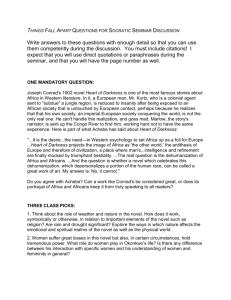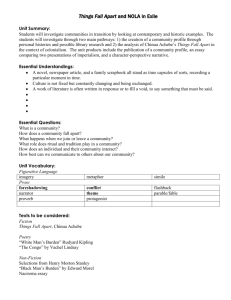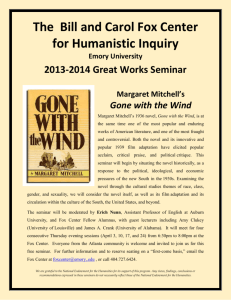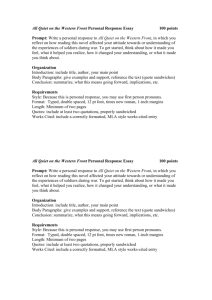Things Fall Apart Socratic Seminar Topics and Questions Explain
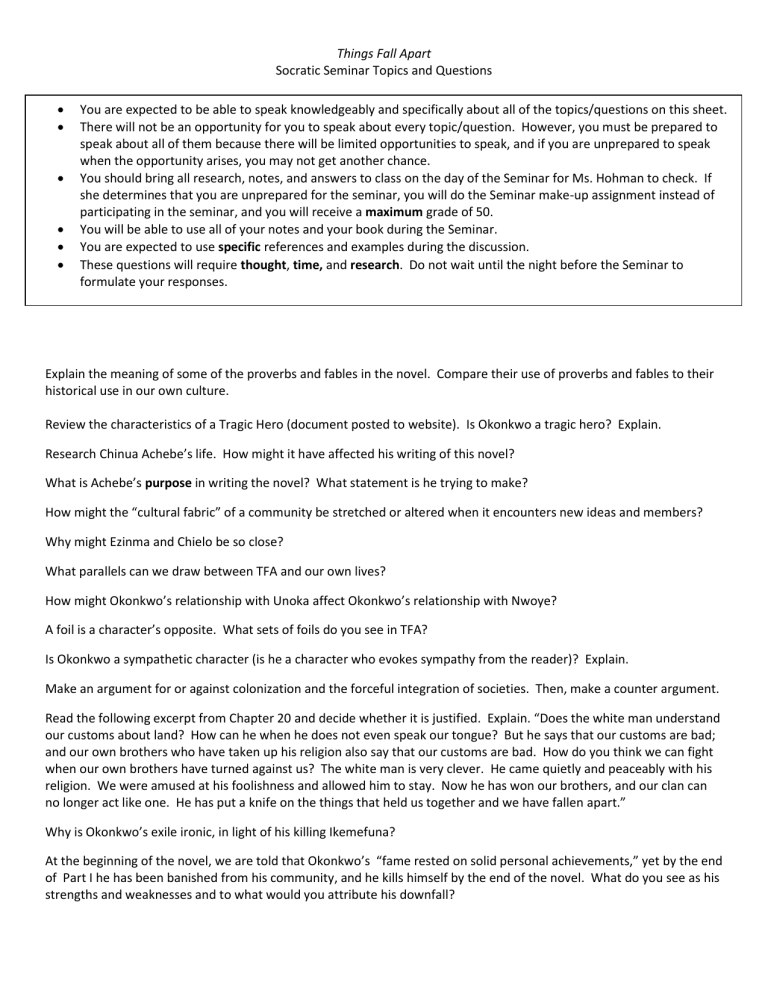
Things Fall Apart
Socratic Seminar Topics and Questions
You are expected to be able to speak knowledgeably and specifically about all of the topics/questions on this sheet.
There will not be an opportunity for you to speak about every topic/question. However, you must be prepared to speak about all of them because there will be limited opportunities to speak, and if you are unprepared to speak when the opportunity arises, you may not get another chance.
You should bring all research, notes, and answers to class on the day of the Seminar for Ms. Hohman to check. If she determines that you are unprepared for the seminar, you will do the Seminar make-up assignment instead of participating in the seminar, and you will receive a maximum grade of 50.
You will be able to use all of your notes and your book during the Seminar.
You are expected to use specific references and examples during the discussion.
These questions will require thought, time, and research. Do not wait until the night before the Seminar to formulate your responses.
Explain the meaning of some of the proverbs and fables in the novel. Compare their use of proverbs and fables to their historical use in our own culture.
Review the characteristics of a Tragic Hero (document posted to website). Is Okonkwo a tragic hero? Explain.
Research Chinua Achebe’s life. How might it have affected his writing of this novel?
What is Achebe’s purpose in writing the novel? What statement is he trying to make?
How might the “cultural fabric” of a community be stretched or altered when it encounters new ideas and members?
Why might Ezinma and Chielo be so close?
What parallels can we draw between TFA and our own lives?
How might Okonkwo’s relationship with Unoka affect Okonkwo’s relationship with Nwoye?
A foil is a character’s opposite. What sets of foils do you see in TFA?
Is Okonkwo a sympathetic character (is he a character who evokes sympathy from the reader)? Explain.
Make an argument for or against colonization and the forceful integration of societies. Then, make a counter argument.
Read the following excerpt from Chapter 20 and decide whether it is justified. Explain. “Does the white man understand our customs about land? How can he when he does not even speak our tongue? But he says that our customs are bad; and our own brothers who have taken up his religion also say that our customs are bad. How do you think we can fight when our own brothers have turned against us? The white man is very clever. He came quietly and peaceably with his religion. We were amused at his foolishness and allowed him to stay. Now he has won our brothers, and our clan can no longer act like one. He has put a knife on the things that held us together and we have fallen apart.”
Why is Okonkwo’s exile ironic, in light of his killing Ikemefuna?
At the beginning of the novel, we are told that Okonkwo’s “fame rested on solid personal achievements,” yet by the end of Part I he has been banished from his community, and he kills himself by the end of the novel. What do you see as his strengths and weaknesses and to what would you attribute his downfall?
Describe the irony of the end of the novel. What types of things might the Commissioner put in his book about
Okonkwo?
Things Fall Apart references the poem “The Second Coming,” by William Butler Yeats, and reflects Senghor’s “Prayer to the Masks.” Read the poems, and be able to respond to the questions indicated under “Poetic Connections.”
Poetic Connections
Read closely the excerpt from Chapter 22 in Things Fall Apart, during which Enoch tears the mask from the
egwugwu. It begins with “The other egwugwu immediately surrounded…” and ends with “It seemed as if the very soul of the tribe wept for a great evil that was coming—its own death.”
Read the poem “Prayer to the Masks” several times.
Answer the question below:
1.
What is the symbolic meaning of the masks?
2.
What similarities do you see between the poem and Things Fall Apart?
Read the poem “The Second Coming” several times.
Answer the questions below:
1.
What kind of “anarchy loosed upon the world” do you think Yeats is talking about? How might this relate to
Things Fall Apart?
2.
How does the line “The best lack all conviction, while the worst/ Are full of passionate intensity” relate to the characters in Things Fall Apart?
What do you think the title of Things Fall Apart means?
Prayer to the Masks
Leopold Sedar Senghor
Masks! Masks!
Black mask red mask, you white-and-black masks
Masks of the four points from which the spirit blows
In silence I salute you!
Nor you the least, the Lion-headed Ancestor
You guard this place forbidden to all laughter of women, to all smiles that
fade.
You distill this air of eternity in which I breathe the air of my Fathers.
Masks of unmasked faces, stripped of the marks of illness and the lines of
age
You who have fashioned this portrait, this my face bent over the altar of white paper
In your own image, hear me!
The Africa of the empires is dying, see, the agony of a pitiful princess
And Europe too where we are joined by the navel.
Fix your unchanging eyes upon your children, who are given orders
Who give away their lives like the poor their last clothes.
Let us report present at the rebirth of the World
Like the yeast which white flour needs.
For who would teach rhythm to a dead world of machines and guns?
Who would give the cry of joy to wake the dead and the bereaved at dawn?
Say, who would give back the memory of like to the man whose hopes are
smashed?
They call us men of coffee cotton oil.
They call us men of death.
We are the men of the dance, whose feet draw new strength pounding the hardened earth.
The Second Coming
William Butler Yeats
Turning and turning in the widening gyre
The falcon cannot hear the falconer;
Things fall apart; the center cannot hold;
Mere anarchy is loosed upon the world,
The blood-dimmed tide is loosed, and everywhere
The ceremony of innocence is drowned;
The best lack all conviction, while the worst
Are full of passionate intensity
Surely some revelation is at hand;
Surely the Second Coming is at hand;
The Second Coming! hardly are those words out
When a vast image out of Spiritus Mundi
Troubles my sight: somewhere in sands of the desert
A shape with lion body and the head of a man,
A gaze blank and pitiless as the sun,
Is moving its slow thighs, while all about it
Reel shadows of the indignant desert birds.
The darkness drops again; but now I know
That twenty centuries of stony sleep
Were vexed to nightmare by a rocking cradle,
And what rough beast, its hour come round at last,
Slouches toward Bethlehem to be born?



